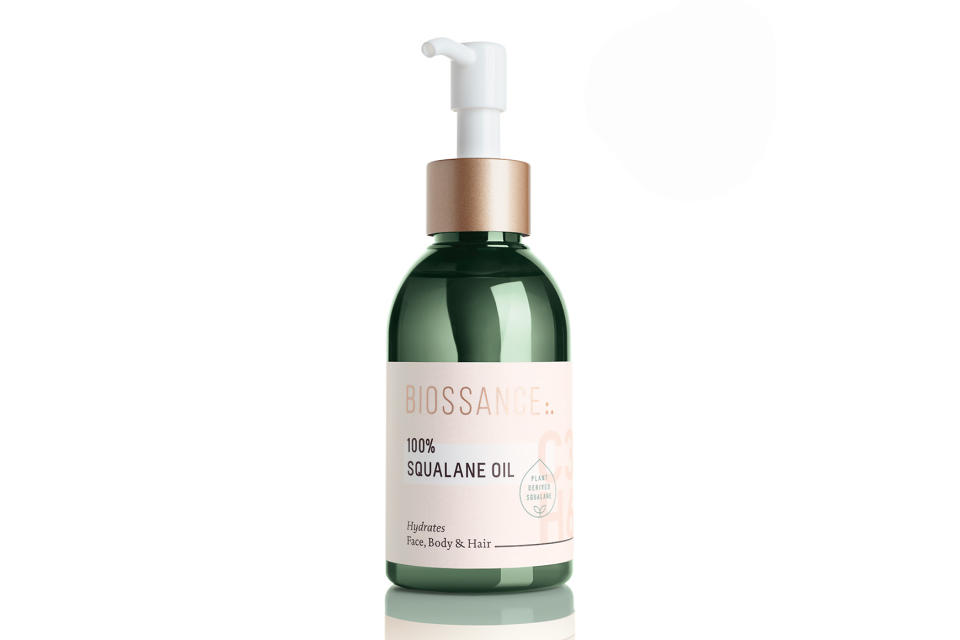Lab-made skincare is going to save your face, your wallet, and the earth
The skincare space is swiftly gravitating towards a cleaner and more sustainable future, and it should come as no surprise that modern technology has played a big part in propelling this movement forward. Right now, biotech skincare ingredients are coming to the forefront of science, changing our serums, face creams, and retinol products for the better.
Biotech skincare uses active ingredients that have been synthesized by genetically engineering microbes (yeast, bacteria, etc.) in a strictly regulated laboratory setting, explains Shasa Hu, M.D. As a result of this manufacturing process, she adds that these ingredients are a combination of microorganisms (bio) and engineered DNA of the microbes (tech), hence the term biotech.
Since biotech skincare ingredients are produced at higher reliability, with better quality control, and have potentially lower adverse effects on the environment, Dr. Hu says that these ingredients have become increasingly popular over the past decade. Some familiar examples of biotech skincare ingredients include hyaluronic acid, peptides, squalane, and fermented polysaccharides.
The new fleet of biotech skincare ingredients is nothing short of impressive, as brands like Orveda have developed lines that use blends of bacteria, enzymes, and yeast that don’t disturb the skin’s natural process and microflora. Similarly, bio-design companies like Geltorm have developed vegan-friendly collagen products (created from microbial fermentation) that are said to increase the skin’s firmness and elasticity.
To give you a closer look at the biotech skincare boom at large, we asked Dr. Hu and several other dermatologists to break down everything we need to know about these ingredients—from whether there are potential safety risks to how sustainable these ingredients really are.
Read on below to see how biotech skincare ingredients can transform your skincare regimen altogether.
What can biotech skincare ingredients do for your skin?
Cosmetic innovations have come a long way, and biotechnology has allowed the beauty space to develop safer and more effective ingredients.
A 2016 study says that biotechnology has been used by scientists and formulators to discover, develop, and produce components of cosmetic formulas, and evaluate the activity of these components on human skin. This often leads to the creation of products containing more effective ingredients. For example, it has lead to the development of plant-based squalane.
Squalane is an ingredient that is now wildly popular in moisturizers, explains Jessie Chueng, M.D. However, squalane was traditionally harvested from shark liver, which didn’t sit well with people who wanted a cruelty-free product. So thanks to biotechnology, a humane version of squalane can be mass-produced. Hadley King, M.D., points out that Biossance is one of the skincare brands that produces bio-fermented, 100% plant-based squalane.

Other important biotechnology-born active ingredients include verbascoside, a compound that apart from protecting skin from free radicals, is also an effective anti-inflammatory ingredient. Similarly, the 2016 study notes that synthesized xylitylglucoside (a sugar-derivative) also has impressive moisturizing qualities and works to stimulate proteins, enzymes, and ceramides essential to maintaining the skin barrier’s health.
Dr. King points out that biotechnology has also revolutionized collagen and fragrance products too: “There is biotech collagen that is designed to be small enough to get through the skin barrier and plump the skin,” she tells HelloGiggles. “Additionally, yeast fermentation is now used to produce rose oil for the fragrance industry, so they no longer have to use actual rose petals.”
Dr. King also says that Swiss fragrance company Givaudan has developed a biotech-produced version of Ambrofix, a biodegradable fragrance ingredient. The technology involves fermenting sustainably sourced sugarcane to produce the ingredient, she adds.
Biotech ingredients can be better for the environment.
Although natural plant-based active ingredients (think essential oils, botanical extracts, etc.) are currently used in many skincare products, Peterson Pierre, M.D., says that these plants take up a lot of valuable farmland, water, and energy to produce. Biotechnology successfully addresses this problem, he adds, saying that lab-produced skincare ingredients usually don’t have the carbon footprint associated with their plant-derived ingredients.
undefined
Compared to natural resources, which are often more expensive and subjective to variabilities such as seasonal changes (crop rate and global market pricing index), Dr. Hu says biotech ingredients are produced at a lower cost. Similarly, she adds that biotechnology’s genetic process can harvest an ingredient at a higher rate and higher consistency when compared to the traditional extraction process, reducing biotech skincare ingredients’ carbon footprint as a whole.
undefined
Finally, biotech skincare ingredients also have the advantage of being free of unwanted irritants and pesticides, as a 2011 study points out that many field-grown plants can be contaminated with pesticides and heavy metals. This makes tech-powered ingredients a potentially safer alternative for those looking for cleaner cosmetic products.
Biotech skincare ingredients are generally safe for human use.
Although lab-created biotech skincare ingredients may raise questions around human safety, the 2016 study says that consumer and testing reproducibility must be guaranteed by cosmetic ingredient producers in order to proceed. This means that biotech skincare ingredients must undergo extremely strict manufacturing and production environment inspections.
Adarsh Vijay Mudgil, M.D., also notes that biotech ingredients have similar safety profiles to their plant and animal counterparts, making them effective and safe for daily use.
undefined
Dr. Chueng agrees with his findings and adds that biotech ingredients can also be engineered to be bio-identical to human structure, making them more effective than ingredients derived from both plant or animal sources. And since the biotech process also allows for more rigorous testing when a skincare product is developed, this allows for a much safer product to hit the market as a result, according to Dr. Hu.
undefined
However, much like many cosmetic ingredients are labeled as safe or unsafe for human use, Dr. King hopes that biotech skincare ingredients are treated similarly in the future. Labeling standards and transparency, she says, will allow consumers to understand and navigate the options available to them.

